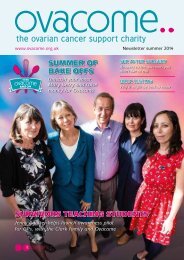Community
06-Spring-Newsletter-2016
06-Spring-Newsletter-2016
Create successful ePaper yourself
Turn your PDF publications into a flip-book with our unique Google optimized e-Paper software.
Speak to a specialist nurse on Freephone 0800 0087 054<br />
WHAT UKCTOCS MEANS<br />
Professor Ian Jacobs, chief<br />
investigator of the UKCTOCS<br />
research:<br />
“These are exciting and<br />
important results. For the<br />
first time we have persuasive<br />
evidence that it is possible to<br />
save lives by intervening in the<br />
course of ovarian cancer by<br />
screening and early detection.<br />
“In a disease in which there has been little progress<br />
in treatment for three decades this is a major step<br />
forward. There is still a bit further to go in assembling<br />
the complex jigsaw puzzle of ovarian cancer<br />
screening, but 85% of the pieces are now in place.<br />
One last big push is needed over the next few years<br />
for follow-up to confirm the mortality reduction and<br />
assess the cost-effectiveness of screening.<br />
“The results provide initial estimates that screening<br />
reduces mortality by 15% to 28%. We now have an<br />
approach to screening using CA125 in the Risk of<br />
Ovarian Cancer Algorithm (ROCA) which can detect<br />
over 80% of cancers, achieves a shift to earlier stage,<br />
has a low false positive rate and seems to save lives.<br />
This is a fundamental contribution to addressing the<br />
challenge of ovarian cancer.<br />
“For individual women considering whether or not<br />
to undergo screening, the trial provides additional<br />
information to enable them to make an informed<br />
decision. In making that decision women will be<br />
influenced by a range of factors including: their risk<br />
of ovarian cancer; their attitude to risk, health and<br />
screening; and by the data about the sensitivity, false<br />
positive rate and mortality benefit of screening.<br />
“I think we will look back in 10 years and see<br />
that these results provided the basis for national<br />
screening programmes which play an important<br />
role in reducing the toll from ovarian cancer. There<br />
will now be a steady stream of refinements in risk<br />
assessment to plan which groups of women to invite<br />
for screening, in determining screening interval and<br />
in developing additional screening tests to add to<br />
the ROCA.”<br />
Professor Usha Menon,<br />
who co-led the trial:<br />
“The results have shown for<br />
the first time that screening<br />
may reduce deaths due to<br />
ovarian cancer. It may be<br />
possible to prevent one in<br />
five (20%) ovarian cancer<br />
deaths if women attended yearly screening.<br />
In the trial, approximately 15 ovarian cancer<br />
deaths were prevented for every 10,000<br />
women who attended screening with a<br />
blood test, followed up with a scan when<br />
appropriate for at least seven to 11 years.<br />
Women who underwent screening were<br />
detected at an earlier stage than those who<br />
were in the no screening arm of the trial.<br />
“However, follow-up of UKCTOCS<br />
participants for two to three years is needed<br />
before we can be sure that the reduction in<br />
deaths is definite. We also need to determine<br />
exactly how many lives could be saved – it<br />
could be less or more than one in five. This<br />
will help us assess the balance between<br />
benefits and harms of screening as well as<br />
cost effectiveness of a programme. Our data<br />
at this point is not sufficient to recommend a<br />
National Screening Programme like for breast<br />
and cervical cancer. However we remain<br />
hopeful that in three years we will be able to<br />
approach the National Screening Committee<br />
with all the information they need to make a<br />
decision as to whether the NHS should have<br />
an ovarian cancer screening programme.<br />
“We are greatly indebted to our trial<br />
participants, the funding agencies and the<br />
many NHS staff who have brought us so far.”<br />
Study author Professor Ian Jacobs, president and vicechancellor<br />
of UNSW Australia and honorary professor at UCL,<br />
co-invented the ROCA in 1996 and is also a non-executive<br />
director of Abcodia Ltd, a UCL spin out company which owns the<br />
ROCA licence. Professor Usha Menon, UCL Women’s Health,<br />
co-led the trial and receives research funding from Abcodia.<br />
4<br />
Follow Ovacome on Twitter and Facebook or visit www.ovacome.org.uk



